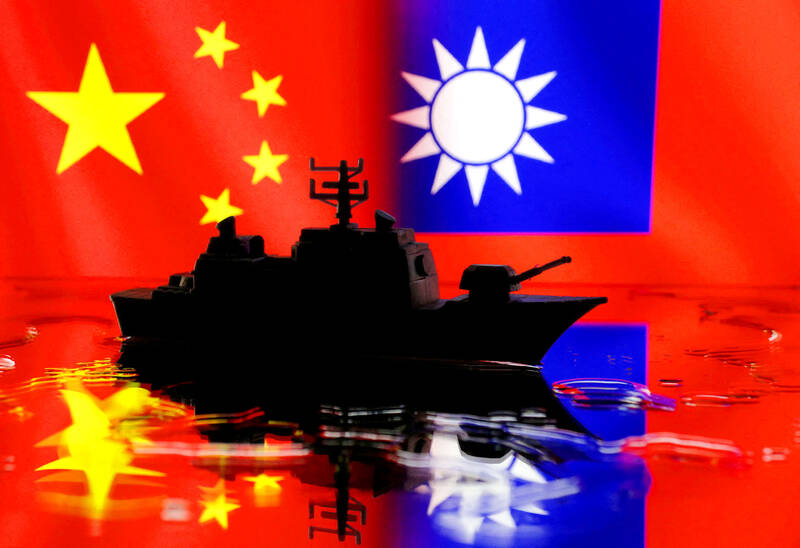This month the government of the People’s Republic of China (PRC) announced a new policy ostensibly aimed at influencing the upcoming presidential election. A top-notch Voice of America (VOA) report observed “China launched a series of influence campaigns against Taiwan last week, unveiling a plan to promote integrated development across the Taiwan Strait.”
The plan, a “demonstration zone,” offers incentives for Taiwanese to live, work and invest in Fujian Province, across the Strait from Taiwan, along with supplies of water, electricity and gas. Using cooperative zones to poach technology and influence Taiwanese is an old plan that has appeared in various forms over the last two decades, sometimes targeting specific industries, as with the Guangdong-Taiwan agricultural experimental zone aimed at Taiwan’s orchid technology. The latest incarnation of this campaign was first drafted in 2021, according to VOA.
INFLUENCE CAMPAIGN

Photo: Reuters
The VOA report correctly identifies the incentives as an influence campaign and presents it in concert with the intimidation program involving PRC aircraft and warships around Taiwan as a “carrot and stick” approach to shaping the election outcome. The military threat too is an old approach the PRC keeps updating, going back to the “missile tests” targeting the 1996 presidential election. Indeed, many analysts suggest that the recent intensification of military intimidation exists to dull Taiwan’s response, so that their alertness drops as they become used to being threatened.
An often-missed aspect of these campaigns centered on Fujian, a friend reminded me on Twitter, is that they signal that Taiwan is subordinate to Fujian Province, attacking its independent identity. During most of the Manchu colonial period — the Qing Dynasty — Taiwan was ruled as a prefecture of Fujian. PRC policy is often intended to replicate that historical colonial relation. For example, the infamous Services Pact that “opened” the PRC actually opened up only Fujian. The intention is obvious.
The more important aspect of this “influence campaign” is that the target is not really Taiwan. The PRC knows Taiwan very well, and its planners are certainly aware that the Fujian demonstration zone will have no more effect on Taiwan than any of its other myriad interactions with Taiwanese. Who is the real target?

Photo: Reuters
It seems clear the ships and planes enclosing Taiwan’s air and sea space are targeting outsiders who might intervene. The “demonstration zone” in Fujian is intended for outsiders as well, to give its servants in the outside world something they can hold up to display Beijing’s “peaceful intentions,” and to keep its noises in the international media.
As many of us noted, the latest round of PRC military exercises around Taiwan, which set the record for aircraft sorties, occurred without any “provocations” from Taiwan. No important US officials were visiting, and no important Taiwan officials were traveling outside Taiwan.
The massive scale of these exercises, which also involved naval activities in the Pacific, clearly show that PRC military exercises are not related to such events. Instead, the PRC holds its normal exercises and if something is happening involving the US and Taiwan, it blames one or both of those nations. It understands that the international media will hype its “anger,” but will never clearly state that exercises are unrelated to anger.
Note that Japan often has exchanges with Taiwan, but the PRC does not normally identify these as a “cause” of its aggression, because one of its goals is to transfer PRC-Taiwan tensions to the US-Taiwan relationship. Clickbait media headlines like “China launches drills around Taiwan in angry response to VP’s US trip” serve the PRC in this goal. They need to stop.
Another target, perhaps the most important, of these activities is the PRC’s own people. Authoritarian leaders are keenly afraid of their lack of popular legitimacy and work constantly to legitimate their actions. Preparing for a likely series of expansionist wars against Taiwan, Japan and other regional powers, the leadership has to demonstrate to its people that it has done all it can to resolve these situations peacefully, to legitimate sacrificing their sons to kill Taiwanese. The people of China, like humans everywhere, do not want war.
HOARDING
Preparing the PRC’s own people for war is one signal. Others abound: hoarding of grain, oil and gold by the PRC is making some observers extremely nervous. April apparently saw the highest volume of grain ever shipped into the PRC, while the media has been reporting that PRC authorities were asking shippers to import grain and sugar as fast as possible. The PRC now hoards over half the world’s grain. Guzzling down cheap Russian oil, PRC oil stocks are the highest in three years.
Maybe these are responses to specific events, such as poor harvests or volatile markets. After all, the PRC has been hoarding grain for years, while PRC firms are infamous for metal hoarding, to the exasperation of PRC authorities. But in the end, whether intended or not, these provide the PRC with the capabilities it needs to support a major war.
Much of the western analysis about how much warning we will have in the event the PRC attacks Taiwan is premised on the assumption it will look like something that would happen in the west. For example, analysts often write that there may be a nationwide blood drive prior to combat. Why? That is necessary only in democracies where compulsion is politically complicated.
The PRC demonstrated with its forced vaccination and testing programs during COVID-19 that it has the will and the staff to compel whatever medical procedures it desires. Once the war begins, it could easily round up specific individuals who match its needs — their identities, blood types, DNA and similar preserved in the extensive medical records it has.
It can even sequester them in its “temporary” COVID-19 quarantine facilities, which still exist, should it so desire, for repeated tapping. Why store blood when it can be sourced at need? Sounds bizarre? Impossible? Selling blood is already a staple income earner for slaving operations across Southeast Asia, run by Chinese gangs.
The analyses of “blockades” are similarly guided by western preconceptions, which imagine the blockades of Germany in the two world wars or of the Confederacy in the American Civil War. The PRC does not need to physically prevent ships from entering Taiwan’s ports. It need merely raise the cost of insurance and shipping to Taiwan to unacceptable levels.
In July, an interesting piece by Joseph Webster at the Atlantic Council argued that “There is something odd about where China is building solar power.” Instead of putting utility-scale solar sites in sun-blessed areas like Inner Mongolia, authorities have ordered that solar panels be installed as wastefully suboptimal distributed solar capacity atop buildings in provinces like Zhejiang and Anhui. Not so great for large-scale power generation, but extremely useful if major utilities are knocked out in war by cyber attacks or similar.
That program is mandated to be finished by the end of this year.
Notes from Central Taiwan is a column written by long-term resident Michael Turton, who provides incisive commentary informed by three decades of living in and writing about his adoptive country. The views expressed here are his own.

Taiwan has next to no political engagement in Myanmar, either with the ruling military junta nor the dozens of armed groups who’ve in the last five years taken over around two-thirds of the nation’s territory in a sprawling, patchwork civil war. But early last month, the leader of one relatively minor Burmese revolutionary faction, General Nerdah Bomya, who is also an alleged war criminal, made a low key visit to Taipei, where he met with a member of President William Lai’s (賴清德) staff, a retired Taiwanese military official and several academics. “I feel like Taiwan is a good example of

March 2 to March 8 Gunfire rang out along the shore of the frontline island of Lieyu (烈嶼) on a foggy afternoon on March 7, 1987. By the time it was over, about 20 unarmed Vietnamese refugees — men, women, elderly and children — were dead. They were hastily buried, followed by decades of silence. Months later, opposition politicians and journalists tried to uncover what had happened, but conflicting accounts only deepened the confusion. One version suggested that government troops had mistakenly killed their own operatives attempting to return home from Vietnam. The military maintained that the

Jacques Poissant’s suffering stopped the day he asked his daughter if it would be “cowardly to ask to be helped to die.” The retired Canadian insurance adviser was 93, and “was wasting away” after a long battle with prostate cancer. “He no longer had any zest for life,” Josee Poissant said. Last year her mother made the same choice at 96 when she realized she would not be getting out of hospital. She died surrounded by her children and their partners listening to the music she loved. “She was at peace. She sang until she went to sleep.” Josee Poissant remembers it as a beautiful

Before the last section of the round-the-island railway was electrified, one old blue train still chugged back and forth between Pingtung County’s Fangliao (枋寮) and Taitung (台東) stations once a day. It was so slow, was so hot (it had no air conditioning) and covered such a short distance, that the low fare still failed to attract many riders. This relic of the past was finally retired when the South Link Line was fully electrified on Dec. 23, 2020. A wave of nostalgia surrounded the termination of the Ordinary Train service, as these train carriages had been in use for decades